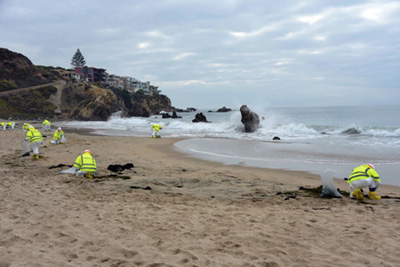
Members of the Orange County shoreline cleanup and assessment team conduct cleanup operations near Corona Del Mar State Beach Park in California, on Oct. 6, 2021. U.S. Coast Guard photo by Petty Officer 3rd Class Janessa Warschkow.
A federal grand jury in mid-December indicted three companies involved in a large oil leak that disrupted Southern California maritime trade and resulted in a weeks-long cleanup.
The three companies, according to the U.S. Department of Justice, are Amplify Energy Corp., Beta Operating Co. LLC—a wholly owned subsidiary of Amplify doing business as Beta Offshore—and San Pedro Bay Pipeline Co., another subsidiary of Amplify.
All are accused of illegally discharging oil during a pipeline break in early October by acting negligently in at least six ways, including failing to properly respond to multiple separate leak alarms over the span of more than 13 hours and improperly restarting the pipeline that had been shut down following the alarms.
The pipeline, which was used to transfer crude oil from several offshore facilities to a processing plant in Long Beach, began leaking the afternoon of Oct. 1, but the defendants allegedly continued to operate the damaged pipeline, on and off, until the following morning.
As a result of the allegedly negligent conduct, an estimated 25,000 gallons of crude oil were discharged from a point about 4.7 miles offshore of Huntington Beach through a crack in the 16-inch pipeline.
The U.S. Coast Guard reported that the spill covered about 13 square miles.
The indictment alleges that the defendants acted negligently by, among other things:
Failing to properly respond to eight alarms from an automated leak detection system that were activated between 4:10 p.m. on Oct. 1 until the final alarm at 5:28 a.m. the following day;
Shutting down and then restarting the pipeline five times after the first five alarms were triggered on Oct. 1, resulting in oil flowing through the damaged pipeline for a cumulative period of more than three hours, and,
Operating the pipeline with crew members who had not been sufficiently trained on the automated leak detection system.
The charge of negligently discharging oil carries a maximum penalty of five years of probation, as well as fines that potentially could total millions of dollars, according to the DOJ.
The Coast Guard and National Transportation Safety Board are also investigating two vessels that may be linked to the spill. On Nov. 19, investigators boarded the vessel BEIJING in the Port of Long Beach, according to Coast Guard Lt. Cmdr. Braden Rostad, chief of investigations for Sector Los Angeles-Long Beach. Rostad said that the vessel was part of an anchor-dragging incident from severe weather Jan. 25 and was in the vicinity of the pipeline found to be the leak source.
The Coast Guard has named the vessel’s operator, V.Ships Greece Ltd., and the vessel’s owner, Capetanissa Maritime Corporation of Liberia, as “parties in interest to the marine casualty investigation.”
The Coast Guard had named MSC Danit operator MSC Mediterranean Shipping Company, S.A., and vessel owner Dordellas Finance Corporation as parties of interest in the investigation on Oct. 15.
The oil leak is being investigated by the Coast Guard Investigative Service, the U.S. Department of Transportation’s Office of Inspector General, the U.S. Environmental Protection Agency’s Criminal Investigation Division and the FBI.
